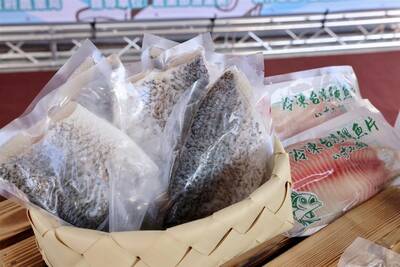The National Science and Technology Council (NSTC), which allocated NT$1 billion (US$31 million) last year to subsidizing international research talent exchanges, has said it plans to put extra effort into recruiting talent from Central and Eastern European, and Southeast Asian countries.
Human resources are fundamental to scientific research and development, which is why the council has been promoting international exchanges of scientific research talent for years, and as a result, the number of incoming foreign researchers has increased over the past decade, the council said.
Incoming foreign science and technology researchers rose to 768 people last year, costing about NT$700 million, the council said.

Photo: CNA
The number of Taiwanese researchers who visited other countries rose to 318 people, costing about NT$300 million, it added.
About 30 years ago, Taiwan was a technology-importing country, but over the years, many Taiwanese who studied in the US returned to the nation to contribute, NSTC Department of International Cooperation and Science Education director-general Tom Yeh (葉至誠) said.
The nation has become a technology-exporting country, and with many young people studying locally, domestic industries are recruiting locals, but a problem of “a lack of international perspective” might emerge, he said.
The council encourages students to study overseas, but at the same time the nation needs to recruit foreign experts for further exchanges and cooperation, he added.
Taiwan faces a low birthrate problem, Yeh said.
Many Southeast Asian countries have cultures that are similar to Taiwan’s, and they attract Taiwanese investments, he said, adding that as a result, more doctoral and postdoctoral researchers from New Southbound Policy countries have been coming to Taiwan over the past few years.
To expand doctoral students’ international experience, the NSTC is to provide funding for 200 students focusing on key scientific research fields to study in Central and Eastern European countries that have cooperation projects with Taiwan, he said.
To stabilize the nation’s research capability, the council would also increase the number of subsidized postdoctoral research fellows and their salaries by 10 percent to 2,400 people to attract outstanding scientific research personnel to the nation, he said.
Among the visiting science and technology personnel who have received council funding is 69-year-old Japanese academic Hikaru Kawai, who is an expert in particle physics and had retired from Kyoto University. Kawai received NSTC funding last year and was recruited as distinguished chair professor at National Taiwan University’s (NTU) Department of Physics.
Kawai said he had been interacting with researchers in Taiwan when he was at Kyoto University, so he is happy to be invited to the nation.
Japan has continued to prioritize expanding bilateral exchanges last year to achieve comprehensive exchanges, he said, adding that the teaching and research quality in Taiwan are as good as at top universities in Japan.
International exchanges are key to the academic development of researchers and students, he said, adding that the government’s support is very helpful to them.
Lin Yung-hsiang (林泳詳), a researcher from Chiayi who received his doctorate from the NTU Graduate Institute of Photonics and Optoelectronics, received the council’s approval for his funding proposal in 2015 and became a postdoctoral fellow at University of California, Berkeley.
Lin was later hired by Taiwan Semiconductor Manufacturing Co and he is in charge of developing advanced optical critical dimension measurement systems.
Lin said that receiving the council’s support had broadened his horizons, allowing him to bring his research from the lab to the real world, so he hoped the NSTC’s program could continue to support more people.

Taiwan's Vice President Hsiao Bi-khim (蕭美琴) said Saturday that she would not be intimidated by the Chinese Communist Party (CCP), following reports that Chinese agents planned to ram her car during a visit to the Czech Republic last year. "I had a great visit to Prague & thank the Czech authorities for their hospitality & ensuring my safety," Hsiao said on social media platform X. "The CCP's unlawful activities will NOT intimidate me from voicing Taiwan's interests in the international community," she wrote. Hsiao visited the Czech Republic on March 18 last year as vice president-elect and met with Czech Senate leadership, including

There have been clear signs of Chinese Communist Party (CCP) attempts to interfere in the nationwide recall vote on July 26 in support of Chinese Nationalist Party (KMT) legislators facing recall, an unnamed government official said, warning about possible further actions. The CCP is actively involved in Taiwanese politics, and interference in the recall vote is to be expected, with multiple Chinese state media and TAO attempts to discredit the Democratic Progressive Party (DPP) and undermine public support of their recall movement, the official said. This interference includes a smear campaign initiated this month by a pro-Beijing Hong Kong news outlet against

A week-long exhibition on modern Tibetan history and the Dalai Lama’s global advocacy opened yesterday in Taipei, featuring quotes and artworks highlighting human rights and China’s ongoing repression of Tibetans, Hong Kongers and Uighurs. The exhibition, the first organized by the Human Rights Network for Tibet and Taiwan (HRNTT), is titled “From the Snowy Ridges to the Ocean of Wisdom.” “It would be impossible for Tibetans inside Tibet to hold an exhibition like this — we can do it. because we live in a free and democratic country,” HRNTT secretary-general Tashi Tsering said. Tashi Tsering, a Taiwan-based Tibetan who has never

A first shipment of five tons of Taiwan tilapia was sent from Tainan to Singapore on Wednesday, following an order valued at NT$600,000 (US$20,500) placed with a company in the city. The products, including frozen whole fish and pre- cooked fish belly, were dispatched from Jiangjun Fishing Harbor, where a new aquatic processing and logistics center is under construction. At the launch, Tainan Mayor Huang Wei-che (黃偉哲) called the move a “breakthrough,” marking Taiwan’s expansion into the Singaporean tilapia market. Taiwan’s tilapia exports have traditionally focused on the United States, Canada, and the Middle East, Huang said, adding that the new foothold in